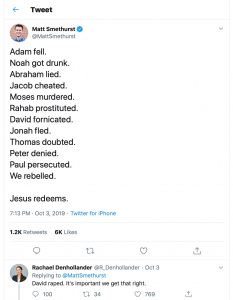It has often been charged that the Bible can’t be trusted because people can make it say anything they want it to say. This charge would be true if the Bible were not the objective Word of God, if it were simply a wax nose, able to be shaped, twisted, and distorted to teach one’s own precepts. The charge would be true if it were not an offense to God the Holy Spirit to read into sacred Scripture what is not there. However, the idea that the Bible can teach anything we want it to is not true if we approach the Scriptures humbly, trying to hear what the Bible says for itself.
—R. C. Sproul—
Key points: Certain evangelicals and evangelical leaders now are saying David didn’t just commit adultery, but that he raped Bathsheba, forcing himself on Uriah’s wife. The irony of this is that these men and women themselves are guilty of forcing on the Scriptures a conclusion that the biblical text does not support. It is difficult to overstate how dangerous this is. With this contemporary-culture-first approach to interpreting the Bible, the account of David and Bathsheba is just one of countless biblical passages that are subject to misinterpretation. We must oppose this and uphold principles of biblical interpretation that first ask, What does the text say?
Against the backdrop of the #MeToo movement, and now also against the backdrop of the Caring Well Conference1 presented by the the SBC’s Ethics and Religious Liberty Commission (ERLC), the idea that King David didn’t just commit adultery, but also that he raped Bathsheba, apparently is taking hold among some evangelical individuals and in certain evangelical circles. This is a serious matter that represents an erroneous approach to interpreting Scripture. It requires a clear and firm response.
At the end of this article I’ve posted an excellent video of a Conversations that Matter podcast by my friend Jon Harris. While Harris discusses more than the nature of the sexual encounter between David and Bathsheba on his podcast, he dives into this particular subject with a good degree of thoroughness, and he sounds the alarm about interpreting Scripture in light of modern culture rather than the other way around. I encourage you to listen to everything he has to say about this topic, beginning at 6 minutes and 29 seconds in. (While everything Jon covers in this episode is important and worthy of your time and attention, here I’m honing in on the material related to David’s sexual encounter with Bathsheba.) Some of my observations in this article will mirror some of Jon’s points in his presentation, and I acknowledge his work as a primary source. Yet we also will cover some additional ground. Buckle up!
Reading the Scripture Through a Modern Cultural Lens
On October 3, Matt Smethurst of the Gospel Coalition tweeted the following statements, and Rachael Denhollander offered her response as shown below.

David raped. It’s important we get that right.
—Rachael Denhollander—
Denhollander’s reply triggered a widespread discussion. On his video podcast on October 9, James White introduced the issue by saying this.

While Rachael Denhollander’s response apparently did bring this issue to the forefront, the idea that David raped Bathsheba did not actually start with her. Consider this Gospel Coalition (Canadian edition) article from April 22, 2018 by Paul Carter, and this Patheos article by Richard Ostling from July 22 of this year. Nevertheless, in part because it was Rachael Denhollander who publicly accused David of rape, people are paying very close attention. Denhollander, you may have noticed, was a speaker at ERLC’s Caring Well Conference.
We must be very careful here. In no way are we trying to minimize the sins of rape, adultery, or any other sexual sin—especially if it is tied to abuse or some other form of mistreatment of another individual. Rape, of course, always is tied to abuse. Even so, we must issue a call to be honest and objective in interpreting the Scriptures. Does the text indicate Bathsheba was raped?
Dig for Evidence in Scripture, and Note Where Evidence Is Lacking

This gotquestions.org article helps us understand what the Bible says about rape. In the Old Testament Law, Deuteronomy 22 presents stipulations that shed light on the events recorded in 2 Samuel 11, where we find the record of David’s and Bathsheba’s sexual encounter. Deuteronomy 22:20-27 says this.
22 “If a man is found lying with a woman married to a husband, then both of them shall die—the man that lay with the woman, and the woman; so you shall put away the evil from Israel.
23 “If a young woman who is a virgin is betrothed to a husband, and a man finds her in the city and lies with her, 24 then you shall bring them both out to the gate of that city, and you shall stone them to death with stones, the young woman because she did not cry out in the city, and the man because he humbled his neighbor’s wife; so you shall put away the evil from among you. [Keep the word “humbled” in mind. We will focus on it and the Hebrew word it represents shortly.]
25 “But if a man finds a betrothed young woman in the countryside, and the man forces her and lies with her, then only the man who lay with her shall die. 26 But you shall do nothing to the young woman; there is in the young woman no sin deserving of death, for just as when a man rises against his neighbor and kills him, even so is this matter. 27 For he found her in the countryside, and the betrothed young woman cried out, but there was no one to save her.”
Generally speaking, these verses indicate that
-
-
- when adultery occurs, both the man and woman are guilty, that
- when sexual intercourse outside of marriage occurs in a heavily populated area and the woman does not cry out for help, adultery — not rape — has taken place and both the man and woman are guilty (otherwise, why wouldn’t the woman have screamed for help?), and that
- when sexual intercourse outside of marriage occurs in a sparsely populated area, the man shall be presumed to be guilty of rape because the woman, even if she did cry out, likely could not have been heard. In this scenario, therefore, the woman, who is physically weaker, is given the benefit of the doubt.
-
We must read 2 Samuel 11–12, which reports the sexual encounter between David and Bathsheba (Uriah’s wife), the murder of Uriah, Nathan’s confrontation of David, and the infant’s birth, sickness, and death, in light of Deuteronomy 22. While David clearly is guilty of sexual sin here, we do not see indications he forced himself on the wife of Uriah.
-
-
- She was bathing, and she caught David’s eye—whether she intended to do so or not.
- The encounter occurred in the city, yet we see no evidence that Bathsheba called out for help.
- Five times in these two chapters—in 11:3,26; 12:9-10,15—Bathsheba is called the “wife of Uriah,” “Uriah’s wife,” or “his [Uriah’s] wife.
- Also, read 11:26 closely: “When the wife of Uriah heard that Uriah her husband was dead, she mourned for her husband.” Not less than three times, this short verse emphasizes Bathsheba’s and Uriah’s marital relationship. The attention given to their marital relationship underscores the sin of adultery—the sin of “stealing” an individual who isn’t one’s spouse and engaging in sexual intercourse with that person.
- Also, read 12:9 closely: Nathan said to David, “Why have you despised the commandment of the Lord, to do evil in His sight? You have killed Uriah the Hittite with the sword; you have taken his wife to be your wife, and have killed him with the sword of the people of Ammon.”
-
Bathsheba’s Apparent Complicity
While the text doesn’t tell us everything we would like to know, the things it does say are significant, and the things it does not say also are noteworthy. Again, we see no evidence that David forced himself on Bathsheba. Apparently Bathsheba didn’t yell for help. Yes, it is clear David had great power and authority in his role as king, but Bathsheba had something that trumped even that. She could have appealed to God’s Law, even as Joseph essentially did in Genesis 39:9. While God had not yet officially given Moses and His people His law (for Moses had not yet been born), Joseph still knew adultery was sinful.
Bible scholar Warren Weiesbe writes,
One of the puzzles in this event is the willingness of Bathsheba to go with the messengers and submit to David’s desires. The Hebrew word translated “took” (laqah) can mean simply “to get, receive, or acquire” or it can be translated “lay hold of, seize, or take away.” However, there seems to be no evidence of force or violence in the text and the reader assumes that Bathsheba co-operated with the messengers. But why?
Did Bathsheba even know why David wanted her? If so, didn’t she stop to consider that, having just finished her monthly period, (v. 2), she was ripe for conception? Maybe she wanted to have a baby by the king! First Kings 1 reveals that Bathsheba was more a tiger than a housecat. “Did the young wife construct the situation?” asks Professor E. M. Blaiklock. “There is much more than suspicion that she spread the net into which David so promptly fell.” [Professor Blaiklock’s Handbook of Bible People, (London: Scripture Union), 1979, p. 210.] Perhaps she thought David had news from the front about her husband, but it wasn’t the king’s job to deliver military announcements. Did she miss her husband’s love and take her purification bath in public as a deliberate invitation to any man who happened to be watching? If she refused David’s requests, would he punish her husband? (That happened anyway.)
No Jewish citizen had to obey a king who himself was disobeying God’s law, for the king covenanted with God and the people to submit to the divine law. Did she think that submitting to David would put into her hands a weapon that might help her in the future, especially if her husband were killed in battle? We can ask these questions and many more, but we can’t easily answer them. The biblical text doesn’t tell us and educated guesses aren’t much help.
The sin that David’s lust had conceived was now about to be born, a sin that would bring with it sorrow and death.2,3
The Contrast Between David’s and Bathsheba’s Encounter and an Actual Rape
There’s more. Immediately following 2 Samuel 11–12, we read, in the very next chapter, an account of an actual rape. Second Samuel 13 is in the immediate context of the previous two chapters, and it stands in stark contrast to the narrative of what happened between the king and Uriah’s wife.
Here are the main characters in the dramatic and tragic series of events of 2 Samuel 13. For a more complete summary, go here.
-
-
- Amnon, King David’s firstborn son. His mother was Ahinoam.
- Tamar, a daughter to King David. Tamar was Amnon’s half-sister.
- Absolom, the third son of King David. His mother was Maacah. Absolom and Tamar were brother and sister.
- Jonadab, a friend of Amnon. Jonadab gave Amnon some very foolish advice, which he followed.
-
After the sexual encounter between David and Bathsheba and the events that surrounded it, Amnon became infatuated with Tamar and wanted desperately to have sexual intercourse with her. Jonadab advised Amnon to pretend to be ill and to request that Tamar prepare him some food. The implication was clear; Amnon knew what Jonadab was proposing, and he followed his advice.
Hearing that Amnon was ill and was wanting Tamar to fix food for him, David sent Tamar to Amnon’s house. We’ll pick up with verse 8 of 2 Samuel 13.

8 So Tamar went to her brother Amnon’s house; and he was lying down. Then she took flour and kneaded it, made cakes in his sight, and baked the cakes. 9 And she took the pan and placed them out before him, but he refused to eat. Then Amnon said, “Have everyone go out from me.” And they all went out from him. 10 Then Amnon said to Tamar, “Bring the food into the bedroom, that I may eat from your hand.” And Tamar took the cakes which she had made, and brought them to Amnon her brother in the bedroom. 11 Now when she had brought them to him to eat, he took hold of her and said to her, “Come, lie with me, my sister.”
12 But she answered him, “No, my brother, do not force me, for no such thing should be done in Israel. Do not do this disgraceful thing! 13 And I, where could I take my shame? And as for you, you would be like one of the fools in Israel. Now therefore, please speak to the king; for he will not withhold me from you.” 14 However, he would not heed her voice; and being stronger than she, he forced her and lay with her.
Note the difference in tone between this passage and 2 Samuel 11. Second Samuel 13 is replete with conflict — a kind of conflict we do not sense as we read chapter 11. David had Uriah murdered to cover up his encounter with Bathsheba, but the murder occurring in chapter 13 is an act of revenge resulting from hatred. After raping Tamar, Amnon hated her and rejected her. David was angry with Amnon but did not hold him accountable. Absolom, therefore, took matters in his own hands and arranged for Amnon to be killed. In part, these events fulfilled Nathan’s prophetic words to David when the prophet confronted the King about his sins. Nathan delivered to David this message from God.
10 “Now therefore, the sword shall never depart from your house, because you have despised Me, and have taken the wife of Uriah the Hittite to be your wife.” (2 Sam. 12:10).
Two Hebrew Words for Took
Earlier we quoted Bible scholar Warren Wiersbe, who noted that the Hebrew word for took in 2 Samuel 11 — laqah — can mean acquire or receive, or it can mean to take or to seize.
-
-
- Laqah is used in six times in 2 Samuel 11–12. It appears in 2 Samuel 11:4 ( “David sent messengers, and took her; and she came to him” ), 12:4 ( “And a traveler came to the rich man, who refused to take from his own flock…but he took the poor man’s lamb” ), verse 9 ( “you have taken his [Uriah’s] wife to be your wife” ), verse 10 ( “you have despised Me, and have taken the wife of Uriah the Hittite to be your wife” ), verse 11 ( “I will take your wives before your eyes and give them to your neighbor” ), and verse 30 ( “he [David] took their king’s crown from his head” ). Go here to see a list of these verses.
- Laqah also is used four times in in 2 Samuel 13. We see words representing it in verse 8 ( “she took flour and kneaded it” ), verse 9 ( “she took the pan and placed them out before him” ), verse 10 ( “Tamar took the cakes which she had made, and brought them” ), and verse 19 ( “Tamar put ashes on her head” ).
-
When the rape is described in 2 Samuel 13, however, a different Hebrew word is used. The word is chazaq, which means to strengthen, make strong, prevail or prevail upon, or to take hold of by force or with one’s strength.
-
-
- The inspired writer of 2 Samuel uses chazaq twice in chapters 11–12, both times in 11:25: “Then David said to the messenger, ‘Thus you shall say to Joab: “Do not let this thing displease you, for the sword devours one as well as another. Strengthen your attack against the city, and overthrow it.” So encourage him.’”
- The writer uses this term three times in chapter 13, with the first two instances describing the rape. We see English representations of chazaq in verse 11 ( “he took hold of her” ), verse 14 ( “being stronger than she, he forced her and lay with her” ), and verse 28 ( “Now Absalom had commanded his servants, saying, ‘Watch now, when Amnon’s heart is merry with wine, and when I say to you, “Strike Amnon!” then kill him. Do not be afraid. Have I not commanded you? Be courageous and valiant’” ).
-
The Hebrew Word Translated Forced
Note as well the words force in 2 Samuel 13:12, and forced in 13:14, 22, and 32. The Hebrew word is `anah, and it means to afflict, oppress, or to humble. Thus, the word force or forced is a fine translation. Each of the four times it is used in this chapter, it describes Amnon’s actions to overpower and rape Tamar.
-
-
- 2 Samuel 13:12 — “But she answered him, ‘No, my brother, do not force me, for no such thing should be done in Israel. Do not do this disgraceful thing!'”
- 2 Samuel 13:14 — “However, he would not heed her voice; and being stronger than she, he forced her and lay with her.”
- 2 Samuel 13:22 — “And Absalom spoke to his brother Amnon neither good nor bad. For Absalom hated Amnon, because he had forced his sister Tamar.”
- 2 Samuel 13:32 — “[O]nly Amnon is dead. For by the command of Absalom this has been determined from the day that he forced his sister Tamar.”
-
Significantly, `anah is the same word translated “humbled” in Deuteronomy 22:24, which we considered earlier. As a reminder, Deuteronomy 22:23-24 says,
23 “If a young woman who is a virgin is betrothed to a husband, and a man finds her in the city and lies with her, 24 then you shall bring them both out to the gate of that city, and you shall stone them to death with stones, the young woman because she did not cry out in the city, and the man because he humbled his neighbor’s wife; so you shall put away the evil from among you.”
It’s important to note that this Hebrew word does not appear at all in 2 Samuel 11 or 12.
Warning: Stop Interpreting Scripture Through a Modern Cultural Lens
Unfortunately, the notion that David raped Bathsheba is indeed taking hold, as we said, among some influential evangelicals and in certain evangelical circles. In his podcast, Jon Harris highlights numerous examples of people jumping on this bandwagon, and he says he could have cited many more.
Here’s the thing. The text does not support the notion that David raped Bahthseba. “Why are some so adamant,” Harris asks, “that it must be rape, it has to be rape?” What drives these people to this almost foreordained conclusion?
The answer is clear. Social justice “Christianity.” Alarm bells really should be going off in our heads over this, because this is a very dangerous movement—and this episode of Conversations that Matter, even by itself, illustrates the danger! Harris issues a warning I want to echo here. He is absolutely right.
Whether intentionally or unintentionally, social justice “Christianity” is making a mockery of the practice of interpreting Scripture.
Those buying into this
are forcing on the text something the text cannot support. This is one of the things I’m passionate about, which is why I am bringing this up. This social justice movement, this #MeToo Christianity — it’s changing the way that we interpret Scripture! This is eisegetical! Completely! And it’s concerning!…Guys, wake up! Wake up! Get back to the real intent. Get back to the clear meaning of the text. Get back to Scripture interpreting Scripture. Get back to the immediate context. Get back to the original audience and what they were supposed to take away from it. I just don’t understand it, quite. I do and I don’t.
Guys, wake up! Wake up! Get back to the real intent. Get back to the clear meaning of the text. Get back to Scripture interpreting Scripture. Get back to the immediate context. Get back to the original audience and what they were supposed to take away from it.
—Conversations that Matter podcaster Jon Harris—
You know, I’ve said this before but hermeneutics was dropped as a requirement for the MDiv when I was at Southeastern. We need more hermeneutics, and we need good hermeneutics—grammatical, historical hermeneutics. This stuff wouldn’t be able to survive with that, though.
And that is why we need to rediscover and recover sound methods of biblical interpretation.
Obviously he was a Catholic who held many theological positions with which I strongly disagree, but Pope John Paul II was right when he said, “Those who devote themselves to the study of Sacred Scripture should always remember that the various hermeneutical approaches have their own philosophical underpinnings, which need to be carefully evaluated before they are applied to the sacred texts.”
Those who devote themselves to the study of Sacred Scripture should always remember that the various hermeneutical approaches have their own philosophical underpinnings, which need to be carefully evaluated before they are applied to the sacred texts.
—Pope John Paul II—
The High Cost of Misinterpreting Scripture
Come to the Bible with a social justice perspective you’re unwilling to abandon, and you’ll come away from God’s Word believing it supports socialism. It doesn’t.
You’ll also come away believing a Christian can, in good conscience, vote for members of a political party
-
-
- that is pushing for an unfettered “right” to kill the unborn and even the newly born,
- that eagerly promotes the militant LGBT agenda, an agenda that runs roughshod over those who merely disagree with with it, and
- that spurns God and is working relentlessly to kick Him out of public life.
-
In addition, you’ll come away believing that an individual can embrace a gay identity and a Christian identity simultaneously, and that “gay Christianity” has something special and beneficial to offer the church. This is a complete distortion of Scripture, and it does neither those experiencing same-sex attraction nor the church any favors. Do not fall for emotional and compassionate-sounding rhetoric that points in this direction.
These positions, and numerous others that are gaining traction in the church, are antithetical to biblical Christianity and therefore are heretical.
Dennis Prager isn’t a Christian. He’s a devout Jew who takes the God of the Old Testament seriously. Yet he also understands the valuable contributions Bible-believing Christians have made to civilization. He strongly supports them and their influence. Prager has said,
There is nothing — not any religious or secular body of work — that comes close to the Bible in forming the moral bases of Western civilization and therefore of nearly all moral progress in the world.
Yet, if we reject or if we fail to use principles of biblical interpretation that genuinely will help us understand and apply what the Bible really says, we will miss its benefits.
After all, knowing the truth of Scripture sets people free.
Let’s choose freedom over bondage!
Copyright © 2019 by B. Nathaniel Sullivan. All rights reserved.
Unless otherwise indicated, Scripture has been taken from the New King James Version®. Copyright © 1982 by Thomas Nelson, Inc. Used by permission. All rights reserved.
Jon Harris and his Conversations that Matter podcast of October 8, 2019
top image credit: Nathan Confronts King David by Matthias Scheits
Notes:
1With regard to the Caring Well Conference, which was held on October 3-5, 2019 in Grapevine, Texas, no one is arguing that the issue of sexual abuse, wherever it occurs, should not be addressed. At the same time, concerns are being raised about the conference and the Convention’s approach to dealing with the issue. Investigative reporter Thomas Littleton has written a series on this; you can access two of his articles here and here.
2Warren W. Wiersbe, The Bible Exposition Commentary, Old Testament: Joshua — Esther, (Colorado Springs, CO: David C. Cook, 2003), 333-334.
3The fact that some would reply to Warren Wiersbe’s insights by saying something like, Well, Wiersbe was a straight white guy! What did he know? is indicative of how dangerous the social justice movement within Christianity really is. Don’t say something like this can’t happen. It already is happening! Here is a news report about a similar sentiment, expressed by a professor at Wheaton College.

I understand why it may be uncomfortable for you to acknowledge that David was a rapist.
If the secular world has a better understanding and response to abuse than the church has, we have a problem.
God hates abuse. If the church would truly lead with appropriate responses to abuse – creating a truly safe place where healing can begin instead of putting sexual assault claims under the rug to preserve its organizations and blaming victims instead, if it would truly do what Jesus would do – many would be saved. Many would not have to leave the church. Many more would come to church.
The body of christ can not ignore this subject and desperately needs being equipped. I pray God will open your eyes and heart. May His spirit and wisdom fill you.
Jeannette,
Thank you for your comments.
Can the church do a better job of addressing the problem of sexual abuse? Of course it can, and it must! However, this does not change the reality that we see no evidence in Scripture that David used physical force in his sexual encounter with Bathsheba. This gotquestions.org article — https://www.gotquestions.org/did-David-rape-Bathsheba.html — admittedly pushes back against the characterization of Bathsheba as complicit that my article carries when it cites Warren Wiersbe’s comments. Even so, the gotquestions.org article is quite clear that the conclusion that David raped Bathsheba is not warranted by the biblical text: “[W]e must be extremely careful about saying things such as ‘David raped Bathsheba.’ Based on the historic use of the word rape, implying violent, forcible, or threat-coerced sex, the claim that ‘David raped Bathsheba’ is entirely false. Nothing in Scripture hints at such a thing. Use of the word *rape* without extensive context is certain to cause misunderstanding. Worse, it can contribute to dilution of the seriousness of the term *rape* as used in other contexts.”
I would also add that the conclusion that David raped Bathsheba is especially not warranted by the biblical text because the word translated “force” and “forced” (a word used four times in the Bible’s report of Amnon’s clear rape of Tamar in 2 Samuel 13 [see verses 12, 14, 22, and 32], and also used in Deuteronomy 22:23-24] does not appear even once in 2 Samuel 11 or 12. My article gives a thorough explanation about this.
Against the backdrop of the suggestion that David raped Bathsheba and the reality that some in the church (I’m not saying you, but some) appear to have a “need” to promote this idea to further the social justice agenda (a reality also highlighted in my article), I believe the warning to avoid allowing prevailing cultural attitudes to guide our interpretation of Scripture is very much needed.
Again, thank you for your comments. And thank you for your prayers as well. I welcome them, and I join you in praying for God’s wisdom for all of us as we interpret the Scripture.
Sincerely,
B. Nathaniel Sullivan